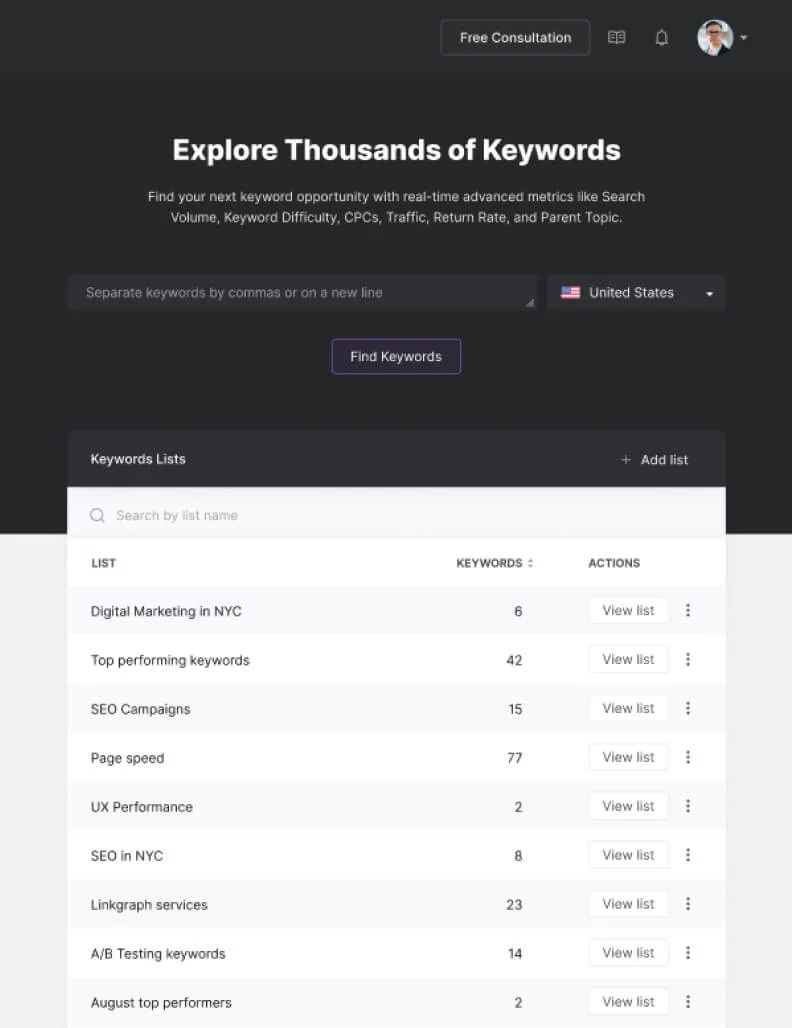Keyword Research Tool
Simplify keyword research with accurate keyword search volume data and essential keyword metrics.

What is the Keyword Researcher Tool?
When developing a new campaign or marketing strategy, there is no better place to start than keyword research. Choosing the right keywords is essential to both earning relevant traffic from organic search and for improving the performance of your Google Ads campaigns. Our Keyword Researcher tool simplifies your keyword strategy with essential metrics and advanced features.
Understand the competitive landscape of specific keywords. Find lower-competition alternatives. Do advanced keyword analysis and find all of the relevant keywords in your niche that present opportunities for your website to get in front of more potential customers.
Find out how many users are typing a keyword into the Google search bar each month.
Understand keyword competition and find the relevant keywords where your web pages stand a good chance of ranking.
See the price per click advertisers pay to target the keyword in a Google Adwords Campaign.
Explore relevant keywords, long-tail variations, and subtopics with the Keyword suggestions feature. Build your content strategy with more keyword opportunities.
Search Volume Checker Basics
Keywords are the words, phrases, topics, and questions that users type into search engines when looking for content on the internet. Keywords represent search intent or the ultimate goal that the user has for entering a specific query. When a website ranks for a competitive keyword with high search intent, that can result in many potential customers clicking to their website from the search engine results pages.
There are thousands of ways that people enter search queries into Google. That’s why your web pages often end up ranking for multiple keywords and phrases. Google looks at your content to understand what it’s subject matter is and will then show it to searchers for relevant keyword results. Google will also rank your SERP result higher or lower in the results depending on a variety of ranking factors.
So when it comes to identifying the keywords that you want your web pages to rank for in search engines, there are a variety of metrics to consider. It’s also important to know that keyword metrics will differ across different search engines like Google, Bing, Yahoo, DuckDuckGo, etc. Because Google’s search engine captures about 90% of the global search market, Google’s keyword data is the most important to evaluate and incorporate into your strategy. LinkGraph’s keyword volume checker uses keyword data from Google, as it is the most essential for any site owner who wants to rank for popular keywords and earn more organic clicks.
Keyword Metrics ConsultationThe Keyword Researcher provides essential keyword metrics to help you craft a more targeted keyword strategy. The keyword tool provides the following data:
- Search Volume – This is the average number of users who are entering the search term into Google every month. Ranking for keywords with higher search volume means more chances for searchers to click on your SERP result. If you optimize your content for keywords with low search volume, you optimize for less people.
- Keyword Difficulty – This metric represents how competitive it is to rank on the first page for the specific keyword. The metric is on a 0-100 scale, with higher KD keywords meaning greater competition. You may be familiar with Ahrefs’ Keyword difficulty metric, but LinkGraph’s proprietary KD score looks at keyword competition a bit differently. We not only consider the number of backlinks and referring domains it requires to get onto page one, but also the content quality and semantic richness needed to show Google’s crawlers high relevance, depth, and quality.
- Search Volume By Country – Our Keyword Researcher will show you the search volume metrics by country. If you want to know the search volume for a keyword in a specific geographic region like the United States, the United Kingdom, or India, our tool makes it easy to see this data at a glance.
- Cost-Per-Click – CPC is the price that digital advertisers are paying in Google Adwords to rank at the top of the SERPs. They pay-per-click, meaning if a keyword has a very high CPC, it likely brings qualified traffic to your website. Qualified traffic are site visitors with high search intent who are likely to perform a conversion action. The best keywords are those that not only bring traffic to your site, but traffic that converts.
- Keyword Suggestions – Our Keyword Researcher will help you get keyword ideas. This feature suggests related keywords, related topics, subtopics, and autocompletes that searchers are also using that have a semantic relationship to your target keyword. For newer or lower authority websites, this feature can help you find low-competition keywords that still bring qualified searchers to your website. There are so many different ways that searchers try to find products and services like yours, and having multiple keyword ideas for your SEO strategy means more ways to get your content in front of your target audience.
The Keyword Researcher also makes it easy to add important keywords to a keyword list and export key metrics in a CSV file. For those webmasters who execute a keyword clustering strategy, our keyword tool simplifies the process and makes extensive keyword research quicker and more efficient.
Keyword Metrics ConsultationOne of the best ways to know what it takes to rank for important keywords is to look closely at your competition. LinkGraph’s keyword search volume tool provides a SERP overview in your keyword report so you can see what it will take to become a top-ranking URL.
In addition to the top 10 ranking urls, the SERP overview feature of the keyword report also provides DR metrics, total referring domains, and site traffic for the top-ranking sites. It takes more than just quality content to rank, and your website may need to build it’s site authority before it can outrank competitors for competitive keywords with high search volume.
If your target keyword is too competitive, our tool makes it simple to find long-tail keywords or low-competition alternatives. These types of keywords also provide opportunities to create new content that targets new keywords and brings more traffic to your website. For a beginner’s guide to keyword research, check out our detailed guide.
Keyword Metrics ConsultationKeyword strategy will differ if you want an organic click in comparison to whether you are paying to rank at the top of the SERP in a Google Ads campaign. The first thing to keep in mind is that your strategy for keyword selection will be slightly different for a Google Ads campaign. It’s important in both SEO and PPC campaigns to target keywords with reasonable search volume, otherwise, your SERP result will not be shown to very many searchers.
However, when it comes to CPC, the strategy will be different. In organic search campaigns, CPC is much different in comparison to a Google Adwords campaign. Ranking for a high CPC keyword organically can mean lots of qualified traffic for very little cost. Paying to show up at the top of the SERPs and paying per click for that same keyword though can get very expensive.
You may be familiar with tools like Google’s Keyword Planner to look up keywords for Google AdWords campaigns, but our Keyword tool provides more comprehensive data and makes it easier to perform keyword research. As you put together a keyword list for SEO or PPC, make sure you consult experts who can help you understand the ins and outs of keyword targeting. You need to be prepared for what those keywords mean for your marketing budget and website’s performance.
Keyword Metrics ConsultationRanking for high-volume keywords organically is not only a powerful customer-acquisition tool, it is easier on your marketing budget than other types of digital advertising. The only downside of SEO is that it can take more time to start earning clicks from search engines, but the benefits of ranking for relevant keyword results can last for years.
Organic rankings can drive traffic to your site for the long term. Webmasters can use our keyword generator to find keyword targets for their blog posts or any website URL and make a ful keyword list. With a consistent content strategy, your landing pages can continually rank for new keywords, meaning more people learning about your products, services, or brand.
There are many free SEO tools out there for which you can check keyword metrics. LinkGraph has a version of a free tool as well as a more comprehensive keyword generator in our customer dashboard. Create an account to get a free trial of the tool, as well as other powerful SEO tools that can help you elevate your site rank across multiple keywords.
Keyword Metrics ConsultationThere are a number of free keyword research tools that can give you information on the average monthly search volume and average CPC of your target keywords for your campaign. However, the price you pay for a click in a CPC campaign will depend on a variety of factors including your max bid, your Quality Score, and who you’re competing against for the keyword.
If you don’t have a Google Adwords account, this keyword research tool will give you the same keyword information. High Search Volume keywords are important to successful CPC campaigns, but be aware of CPCs that may be too high or take a big hit on your marketing budget.
Although our free keyword tool can help you do initial keyword research for your Google Adwords campaign, we strongly recommend consulting with PPC professionals to better understand Google trends and CPC costs.
Keyword Metrics ConsultationWhen our SEO experts do keyword research, they identify hundreds of potential keywords in order to create strong keyword clusters. Keyword clusters are terms that represent similar search intent. With our search volume checker, you can identify essential keyword metrics for hundreds to thousands of keywords and easily add their accompanying data to a list.
Once you have a complete keyword list, easily export a CSV file or spreadsheet to use for your clients or in-house team members. We suggest organizing clusters by choosing a combination of higher and lower search volume keywords. It’s also good to include a combination of short-tail keywords with the most salient long-tail search queries.
By optimizing for multiple keywords instead of just one, your landing page or blog posts can improve the total number of keywords they rank for. To improve the ranking potential of your content, you can also utilize our SEO Content Assistant. Our tool allows users to optimize for up to 5 keyword targets.
Keyword Metrics ConsultationThe truth is that there are hundreds of factors that affect how pages rank within Google’s search results. For an in-depth piece on keyword research, check out our blog, Keywords 101: A Beginner’s Guide.
- Identify Search Terms with Enough Search Volume
- Narrow in on Terms with Commercial Intent
- Filter by Keyword Difficulty
- Select Terms Specific to Your Core Business
Your keyword research journey should begin with the keyword volume metric. Start with keyword ideas you think potential customers would use when looking for your products or services and check that keyword’s search volume. If there’s no search volume, your target audience may be thinking of your business in a different way.
As the old adage goes, it’s a good idea to “use the same language as your clients.” This is especially true with searchers. Search volume is a great indicator of how the general population thinks about your business. Natural language processing and synonym vector correlations are continually advancing, but there’s still a substantial direct correlation to the search terms entered into browsers and page content.
Once you understand which queries are actually being used by searchers, you’ll want to narrow in on specific keywords that have commercial intent.
The first thing you can do is sort your potential keyword list by CPC. CPC is a great indicator of how the market views a search query. High CPCs mean that the market has determined that searchers using that query have high commercial value (aka are likely to lead to a purchase). These terms are likely to be converting for the internet as a whole.
Now filter the list by keyword difficulty. The higher a particular keyword’s difficulty is, the more work you will need to do to reach the first page of search for your primary keyword. If you have a brand new site and you’re competing with massive well-established sites, you’ll have more success targeting long-tailed keywords than competitor keywords. These terms tend to have lower overall search volume, but also less competition. If you’re just starting out, target these easier-to-reach terms first.
This SEO strategy also has an added benefit – the more specific a search query is, the more likely the user is to take action based on their search. Specific search queries are often called long-tail keywords. Long-tail keywords are made up of multiple words, usually including modifier terms such as location, size, shipping speed, price, color, etc. Here are a few long-tail keyword examples:
- red polka dot midi dress <$50
- used 2012 Toyota Camry
- dentist in south slope, Brooklyn
- google’s 2012 algorithm update
- best sites for creating a free website
- where to donate to 2020 environmental candidates
Keyword research can help you identify related topics to blog about as well as particular keywords to target for landing pages. If you run a tourism site and want to generate higher traffic to your pieces, ditch the simple seed keywords like “best restaurants” and focus instead on more specific terms like “Wednesday restaurant specials NYC”.
Keyword Metrics ConsultationAll the data you need. In one place.

When to Use a Keyword Research Tool






Keyword Researcher Case Studies
Our team of SEO specialists have worked with brands of all sizes to perform keyword research and selection. We help brands narrow in on the keywords that will drive the most qualified traffic to their website. Read our case studies to learn more about how our software and services have helped brands across industries.























































































